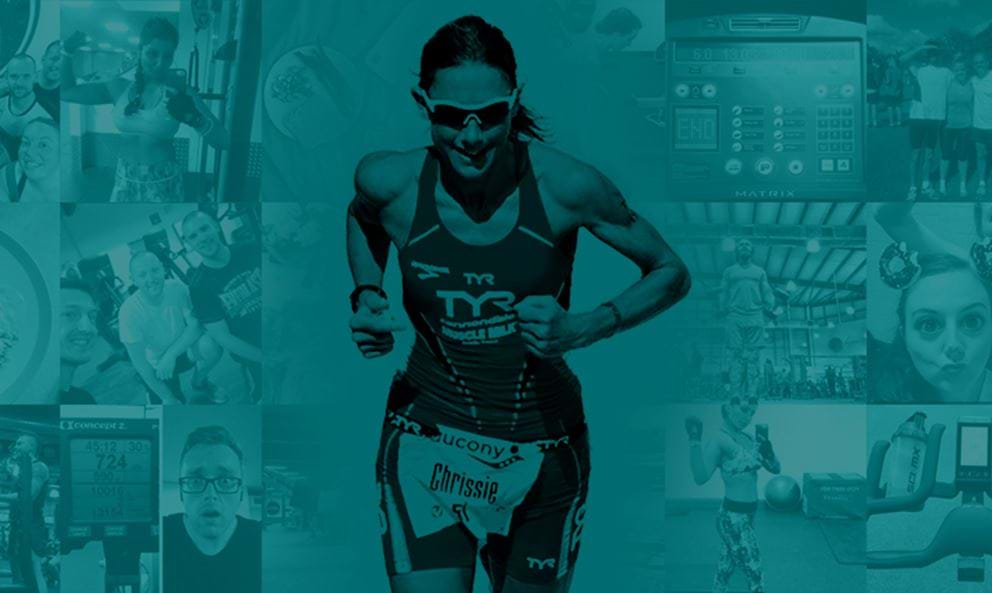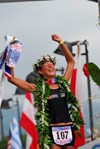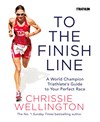Interview with Chrissie Wellington, four-time World Ironman Champion and member at Bristol Union Gate

We caught up with former professional British triathlete, four-time World Ironman Champion, former Sunday Times Sportswoman of the Year, an OBE, and member at PureGym Bristol Union Gate, Chrissie Wellington, who recently brought out a book ‘To The Finish Line: A World Champion Triathlete's Guide to Your Perfect Race'.
My name is Chrissie Wellington, although ‘Christine’ to my brother, and ‘Muppet’ to many of my friends!
I used to do triathlons professionally, and now work as Global Head of Health and Wellbeing for parkrun, as well as dabbling in a few ultra-marathons on the side. I love life, and try to seize every opportunity that comes my way.
How did you first become interested in triathlon?
Growing up I never imagined I would become a professional athlete! Basically I wanted an activity to de-stress from the academic work, as well as something that would help me get healthier after a few years of indulgence! I started off slowly, with an old pair of trainers and a baggy t-shirt and shorts, and then gradually increased the time and distance. I was chatting to a friend who had run the London Marathon in 2001 and who had grown up with a heart defect and I realised that if she could do it then so could I.
I got a charity place for the London Marathon in 2002, and that was my first foray into endurance sports.

After the marathon in 2002 I started training with a running coach, the late Frank Horwill. I certainly wasn’t setting the running world on fire and, to be honest, I didn’t really think of myself as a talented runner or endurance athlete.
It was a friend who suggested I try triathlon in 2004, and I leapt at the chance. I did these first triathlons all on an old, borrowed bike and a very big wetsuit that didn’t fit me. I really enjoyed it – but I also wanted to work overseas and so in September that year I went to work in Nepal for 16 months. I bought a mountain bike and cycled every single day before work. I returned to the UK in 2006, and entered a few triathlons as an amateur – and qualified for the World Triathlon Championships.
I got a coach, trained really hard for 10 weeks and managed to win the world amateur title.
I seriously couldn’t believe what I had achieved. Then I had to decide whether or not to take the risk, give up my job as a policy advisor to the Government on international development and become a professional triathlete.
We all have talents, some we tap into and others may lay dormant unless we have the courage to take a step into the unknown, try something new, without fear or the imposition of preconceived limits on ourselves.
What do you love most about the sport?
The opportunity to challenge myself push myself to the limit, to battle against my competitors, to (hopefully!) reap the rewards of my hard work, to travel and see new places, to inspire people, to go outside of my physical and mental comfort zone, and for that awesome legal ‘high’ of doing something I love!
What did your weekly training schedule look like as a professional athlete? How has it changed since you have retired?
Back in 2011 training for 4-6 hours a day and racing for 8 or 9 hours was second nature. I devoted 5 years to being the best athlete I can be. No short cuts, no stone left unturned. And I loved every minute. I feel incredibly fortunate and grateful to have found a sport that I love; to have had the chance to actually make that passion my career. But training and racing couldn’t always be the axis around which my life revolved and since retirement I’ve had to mentally and physically move on, and distance myself a little bit from the athlete that I was.
So, yes, life is different now! My husband and I have a wonderful (and very energetic!) daughter, and a job, a social life…lots of balls to juggle.
I do try to exercise for an hour a day, which is mainly running, but have to be more flexible and also accept that I can’t always control everything like I used to – sleep, nutrition, strength work etc.
That’s not to say I can’t have goals, and focus on them, but I also have to accept that, if I want to have balance, it also means modifying the goals to fit in with the other priorities in life.
What have you been up to since retiring?
Let’s just say I haven’t been sitting with my feet up, and I feel really lucky to have been able to carve out a really fulfilling path post triathlon. I have done a number of endurance challenges, multi-day cycle sportives in the Alps, the self-styled ‘4321 Challenge’ where myself and three friends ran up each of the three peaks (Wales, England and Scotland) and cycled the 450 miles between them – in 47 hours, all for charity. This year I ran the London Marathon and did my first ultra-marathon.
In terms of work, I set up the junior parkrun series of 2k events for 4-14 year olds, and am busy implementing my strategy for increasing participation for parkrun, helped to launch a women’s race at the Tour de France …Oh, and I got married and gave birth! I also managed to squeeze in writing my new book, ‘To the Finish Line: A Triathlon Training Guide’. It’s definitely more exhausting than being a professional athlete!
How did – or do – you cope with pain and discomfort in racing?
It’s in training that we can condition ourselves to endure, and develop the strategies for overcoming self-doubt, discomfort.
Set yourself goals in training that you may not think are possible, test yourself periodically to go beyond your conceived limits and bank those memories and experiences, to give you confidence that come race day you can do the same.

If you had to squeeze in a workout in 10 minutes or less, what moves would you do?
I’d definitely put my trainers on and go for a run!
What is it about parkrun and the ideology behind it, that appeals to you so much?
I have always been passionate about development, and specifically promoting participation in physical activity for all. And parkrun does just that – breaking down barriers to participation, through the organisation of free, weekly 5k and 2k (for juniors) events in areas of open space all over the UK, and the world. I feel really proud to work for an organisation that really is changing lives for the better, and look forward to what we can do in the future.
How do you stay motivated to train/exercise?
Remember your goal, and that getting out in the rain to do a run, for example, is a step closer to that goal. And remember why you set the goal in the first place. For instance, the goal might be to complete your first half marathon, and the reasons – or motivational carrots – are to improve your health, meet new people, to prove to yourself that you can meet the challenge, to honour a loved one’s memory, or raise money for charity.
Starting is often the hardest part. So, do just that. Start.
Remember that around the two-minute mark your cells more easily utilise oxygen as a fuel, muscle temperature rises, and exercise becomes easier. And make training as convenient as possible. For example, find a gym, run track, pool that is accessible and financially affordable; keep your running clothes at the office so you can do a quick session in your lunch hour.
Try new things too – maybe you can run on forest trails, instead of pounding the same old roads? Chart your progress in a log, ensuring you bank feelings of euphoria to draw on in future. A little bit of bribery never hurts, so occasionally reward yourself and take time to celebrate what you are achieving along the way.
Replace energy-sapping thoughts of “I’m knackered. I want to sit down and eat a doughnut. It’s raining and my new shoes will get muddy” with positive affirmations, images of sunshine and smiles or your personal mantra. I write ‘Never Ever Give Up and Smile’ on my race wrist-band and my water bottles. And don’t forget to spend time on visualisation. You are only as powerful as your mind.
What are the greatest lessons you’ve learnt as an athlete?

In every Ironman I’ve done I’ve wanted to quit. That little voice in one ear that says ‘pull to the side, it’s not going to be your day’.
But I’ve pushed through, repeating my mantra ‘never ever give up’, playing songs in my head, counting repetitively in time with my pedal stroke or footsteps, breaking the race down mentally into manageable segments, and ultimately recalling all the times I’ve overcome discomfort and adversity in the past.
Here’s a few lessons I have learned along this crazy life journey – follow your passion, always be prepared to try, be kind to yourself and know that you can achieve more than you ever thought possible. Oh, and smile!
What’s your advice for someone who’s starting their fitness journey?
A couple of things I have learnt along the way are to start slowly, and be patient. You need to take your time, and also overcome lows and occasional failure, if you want to achieve your goals.
I would encourage people, regardless of ability to have a realistic, but ambitious, goal – and work out the steps that they need to take to get to that goal. And make that goal, tangible.
Lastly, you might not succeed at first but never give up – you can achieve your goals. Just be patient and have faith in yourself, dream big and most importantly ENJOY IT!
What’s your advice for someone who is training for their first triathlon?
I’d tell them to go for it! I would suggest they take the bull by the horns and enter a race, join a local triathlon club and make sure they have the bare minimum in terms of equipment and kit. Most importantly, I’d emphasise the need to enjoy the process, make new friends and relish the opportunity to try something new.

After the success of your first book, your autobiography A Life Without limits, why did you write this new book?
It was a totally different experience, but no less enjoyable and challenging than writing my autobiography! I wrote my first book while I was still a professional athlete and the process was extremely cathartic, and quite challenging emotionally as I divulged details of my personal life that I hadn’t really shared before.
This latest book came from a realisation that the autobiography left many questions unanswered, especially around the specifics of training and racing. So I set about creating a more detailed, structured guide, but one that was accessible and readable – not a dry, dull technical manual. It covers an array of subjects – everything from setting goals, nutrition, training for swim, bike and run, race strategies, strengthening your mind, coping with eating disorders, and exercising when pregnant. In many ways it contains lessons that transcend sport, and can be applied to all areas of life. You definitely don’t have to be a triathlete – or even an athlete - to benefit from it. I really enjoyed writing it, and working with a few of my closest advisors and mentors on certain subjects has hopefully added a bigger splash of colour.
What's next for you, in terms of both career and family life?
I think this question is best answered by plundering the final paragraph of my autobiography ….which goes a little something like this….
“…how can I speculate on what the future holds, when the present is so astronomically removed from whatever expectations I might have had in my youth? My only policy throughout has been to keep an open mind and, whatever I may do, to give it my all. It still takes my breath away to think where that simple outlook on life has taken me. I never set out to be a world champion – not many ordinary girls from Norfolk do – but neither have I ever wanted to be left wondering, ‘What if..?’ At so many stages along the way, the limits that I thought I could see lying ahead dissolved as I approached them. And that has been the most exciting discovery of all”.



